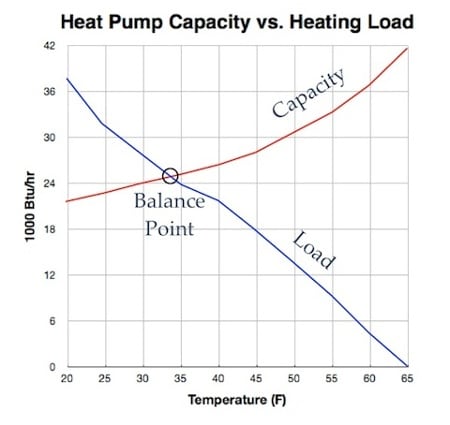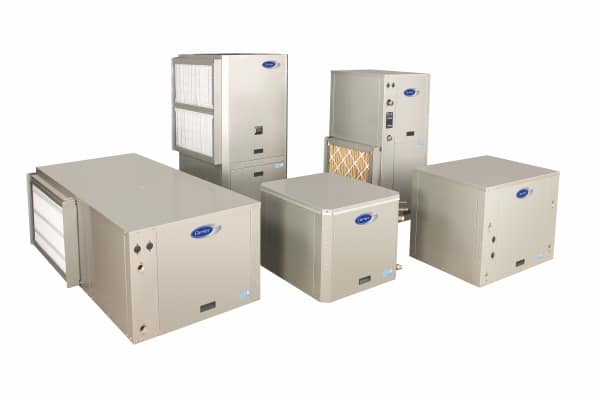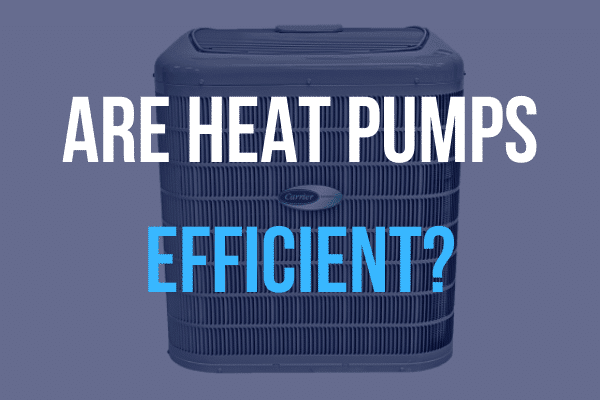We all want to have the most efficient heating and cooling system, right? After all, heating and cooling costs make up the largest portion of our energy bills in the United States. So, the more efficient our heating and cooling system is, the more money we can save!
Now that I’ve got you persuaded of how important efficiency is when it comes to your heating and cooling system (not that you needed any persuading), let’s get back to the question at hand.
Are Heat Pumps Efficient?
Yes, in the right climate, heat pumps are very efficient.
100%+ efficient!
In fact, heat pumps are one of the most efficient HVAC systems available today. And, to top it off, they provide both heating and cooling for your home all from one single unit! This means that they are typically a cheaper upfront purchase when compared to a split unit (separate air conditioner and furnace).
What’s the Catch?
Yes, there is a catch. Heat pumps lose their efficiency in colder weather. When the temperature drops below freezing, heat pumps can really struggle to provide adequate heat while maintaining a high level of efficiency. This doesn’t mean that they won’t provide heat. It just means they will likely use more electricity to do so which reduces the heat pump’s efficiency level.
You can see an example of this loss in heat production and efficiency in the chart below. And, you can see that the balance point in this case is right around 32 degrees (F). Beyond that temperature, the heat pump will have to work very hard to try to produce adequate heat and will likely need a supplemental heat source to keep up.

Why do heat pumps lose their efficiency?
Well, heat pumps literally pump heat into your home. And where do they get this warm air that produces that heat? From the outside environment. The less warm air there is, the less effective the heat pump will be at producing heat. Compare this operation of a heat pump to a furnace and you will see they are totally different. A furnace literally produces its own heat so it isn’t limited on the amount of heat it can produce.
Related: Heat Pump vs Furnace: Which is Better?
Since the obvious disadvantage of a heat pump is its vulnerability in colder weather, is there a way to improve its ability to produce heat in these climates?
Can a Heat Pump’s Efficiency Be Improved in Colder Climates?
There are solutions that can improve the heat producing ability of a heat pump in colder climates, which will improve its efficiency in those climates. These solutions include:
- Heat strips – Heat strips, or auxiliary heat, are a supplemental heat source that provide an extra heat producing element to a standard air-source heat pump setup. When the heat pump isn’t able to produce adequate heat on its own, electric heat strips can be activated. These additions provide enough extra heat to maintain a comfortable indoor temperature in most climates.
- Dual fuel heat pumps – If you have access to a gas source, you can consider a dual fuel heat pump. A dual fuel heat pump operates as a normal heat pump under ideal temperatures. But, when the temperature outside drops to a certain level, the included supplemental furnace kicks in a takes over the heating operation. As we’ve already explained, furnaces don’t have any problems keeping your home at a comfortable temperature despite the weather conditions.
- Geothermal heat pumps – Geothermal heat pumps extract heat from the ground rather than the air. This allows for a consistent source of heat even in colder weather. They don’t require a backup heat source in colder climates and their efficiency is fairly consistent year round – in both very hot and cold weather. If you have a body of water on your property you can also consider a water-source geothermal heat pump which is typically cheaper than a ground-source geothermal heat pump and just as effective.

Wrapping It Up
Are heat pumps efficient?
Absolutely!
But, they tend to lose their efficiency in colder weather. There are solutions to improve a heat pump’s efficiency in colder weather such as auxiliary heat sources like heat strips. If you are looking to purchase a heat pump and you live in climates that are consistently below freezing, you can also consider other options. These options include dual fuel heat pumps and geothermal heat pumps. These options do cost more upfront, but they will be more efficient in extreme weather conditions than a standard air-source heat pump with heat strips.
I hope this post has given you the answers you were looking for! Feel free to share any thoughts or questions you might have in the comments section below!
We are a HVAC company located in Jackson TN. If you are in our service area and have any interest or questions concerning a HVAC purchase or repair, feel free to give us a call at 731-300-1030.



